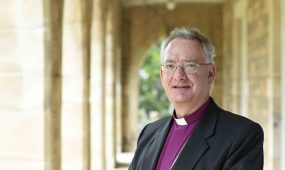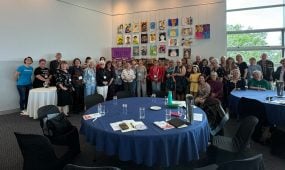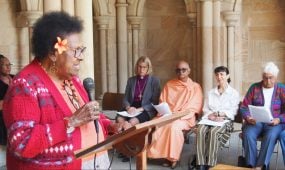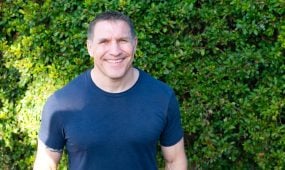Synod: ‘What is God calling us to be, and to do, at this time?’
Reflections
“In the way that Open Space works, every member of Synod will be able (if they wish) to respond to this question and propose their idea for a topic or question for a breakout conversation,” says Justice Unit Coordinator Jennifer Basham

“Sounds like something from a Star Trek episode.”
“Why don’t we just…do…something?
“What if someone raises something really odd?”
Starting a conversation about ‘Open Space’ opens up all kinds of kinds of stories and perspectives people have about how we live our lives together, how we should work out our shared challenges, or enact our shared dreams.
By ‘Open Space’, I am talking about a methodology, sometimes also called ‘Open Space Technology’ or OST. It is really just a simple process for bringing groups together to dialogue about and discern things that matter to them.
This conversation also brings to the fore the many head-scratching complexities of the world we live in – for we are living in a time of intensely rapid change.
When I was in high school, our family had one phone. It was plugged into the wall near the kitchen in the earshot of Mum. Now my 11-year-old nieces and nephews have their own phones and can text me cheeky messages anytime they want on smart phones, powered by computers many times more powerful than that of the spaceship that put the first human on the moon. So fast has that change been, and I am a millennial, albeit at the older end…!
There has been much written about this digital world of ours – how quickly everything moves now. How simultaneously hyper-connected, yet somehow personally disconnected we seem to be becoming, retreating behind the anonymity or the distance of Facebook profiles and Twitter handles.
Amidst this, the Church, too, faces great challenges. We are trying to live out the gospel message in a period variously described as ‘the Anthropocene’, the ‘information Age or the ‘post-Christian Era’.
Advertisement
So the uncertainties and paradoxes bubble up in our collective musings.
We have a thirst for action, for seeing things get done, and look to our leaders to act decisively. Yet many people also express a desire to be heard, listened to, and to help shape our collective futures.
Without recognising the irony at the time, I will admit to having uttered exasperatedly in the past about a management, or a leader, “Why don’t they do something! Why don’t they listen to us?!” I have come to realise that underneath this exasperation lies a truth, expressed in this much-touted quote from Laurence J Peter:
“Modern organisational problems are so complex that you have to know everything about them just to be undecided about which way to act.”
What this ultimately reveals is that in our complex world, there is no singular, correct solution to any of our most complex challenges. It may work for building a car, a highly technical but straightforward task, but there are no silver bullets for something like ‘building a community’.
Advertisement
In our society we have been trained to think that we figure out where we want to go, and plot our ten steps to get there – that we follow the leader and fly there in a straight line ‘as the crow flies’. The reality is never that straightforward!
It is more like a ship crossing a vast ocean. We know we have a vague point we wish to reach, but we will need to trim our sails constantly, to tack and weave in the face of great currents or light winds. There may be someone at the till, but it is a collective effort to sail the ship safely through the high seas.
Moreover, ‘building a community’ has its sharp limitations in the online world. Complex, interwoven challenges require us to share and dare together, in person.
And not only do we live in a world of increasing complexity, but as Christians we strive to understand how to join in God’s mission for us in the world, and there is surely nothing more complex than that!
This is why the Open Space proposed for our Diocesan Synod this year is such a wonderful opportunity for the Church. The Synod will be gathered by the question:
‘What is God calling us to be, and to do, at this time?’
In the way that Open Space works, every member of Synod will be able (if they wish) to respond to this question and propose their idea for a topic or question for a breakout conversation.
Over subsequent rounds of dialogue, everyone will have the freedom to follow their own passion and take responsibility to choose which conversations matter to them, and to go and take part in those for as long or as little as they like.
Usually during about six hours of Synod we would expect maybe 15 to 20 people to speak, and maybe half a dozen or a dozen items to get covered. These are usually important, albeit sometimes dry, issues about governance and the like. Having watched many a Synod from the mezzanine level, I can see what a complicated procedural experience it is, and how intimidating it must be to be on the floor of Synod taking part. Most years it seems to be the same small number of articulate, confident people doing all the talking.
But with Open Space, the Synod will be responding to a pressing and urgent question that faces us all in the Church right now. One that no single person could possibly have ‘the answer’ to. Over six hours, we could have dozens and dozens of ideas and questions raised and explored by the whole of Synod together. In this way, every voice can be heard, and there is room for the spirit to move. The process lends itself to a form of collective discernment.
When we first hosted the Abundant Justice gathering in 2017, we had a group of about 60 who engaged in Open Space dialogues. The following year we ran it again and had a group of well over a hundred who participated. I was initially very nervous about it, as many people coming into it, had said they did not know what it was and were very dubious or uncertain as to what to expect. But as the process was explained and the conversations started to unfold, they became absorbed in conversations they cared deeply about. They found connections with people they never knew shared the same passion. Some half-baked ideas were let go, and some new ideas arose from the dialogue. Afterwards it was variously described as …‘inspirational’, ‘enriching’, ‘surprising’, ‘encouraging’, ‘stimulating’, ‘positive’, and ‘energising’.
Related Story
 Video
Video
Archbishop’s Open Space Message to Synod Members 2019
Allowing time this year for the Synod to dialogue and discern on matters that go beyond governance, and go to the heart of what it is to be our Church right now, this is such an exciting prospect to me.
I will certainly be praying for all our Synod, and that everyone might enter into this process with confidence and an open heart as to what shared dialogue might bring. May we all keep their deliberations in our thoughts, and look forward in anticipation, to seeing what might emerge from our Synod in 2019.
You can watch a video that shows what an Open Space looks like here and one that describes the principles for how the process works here.





